SC doctoral student Amirhessam Tahmassebi presented three papers at the SPIE conference in Anaheim, California on April 9-13, 2017. Tahmassebi works with Professor Anke Meyer-Baese and is studying data mining and medical imagining. He has extensive research and programming experience in data science, scientific computing, data mining, medical imaging, machine learning, predictive modeling, statistical analysis, and data visualization. Tahmassebi’s paper titles and abstracts appear below; he is preparing himself for a career as a data scientist.
The Society of Photo-Optical Instrumentation Engineers (SPIE) is the international society for optics and photonics. Its mission is to advance emerging technologies through interdisciplinary information exchange, continuing education, publications, patent precedent and career and professional growth.
- The driving regulators of the connectivity protein network of brain malignancies
Novel visualization techniques are proposed to analyze the multi-source data of brain cancer stem cells and to reveal hidden relationships between these data that can be used for therapeutic purposes.
- Reconfigurable wearable to monitor physiological variables and movement
As people have become more aware of their health, the number of WHS (Wearable Health Systems) on the market has increased dramatically in the last few years. These WHS are mainly focused on variables such as heart rate, saturation of oxygen (SpO2) or ECG, along with other parameters related to sport, such as running speed or calories burned. This work presents an example of these WHS, which combine heart rate and SpO2 monitoring with other signals associated with physical activity (steps, distance, speed and calories burned). This design uses non-invasive techniques and reconfigurable electronics for sensor information fusion.
- Dynamical graph theory networks techniques for the analysis of sparse connectivity networks in dementia
Dynamic graph networks model the temporal evolution of dementia and help us understand the disease, improve therapeutics and establish insights into longitudinal studies.
For more information, check out:




